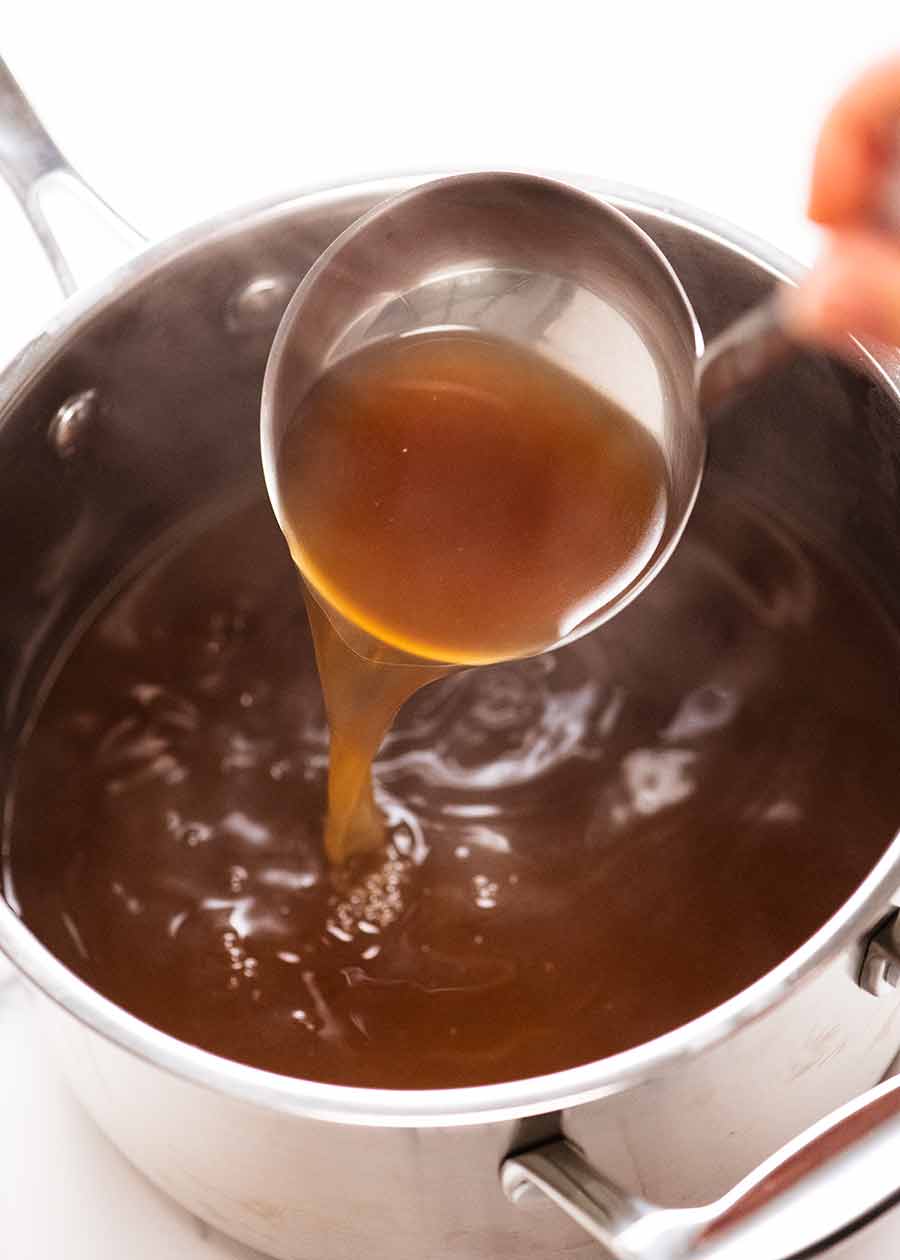Homemade beef stock recipe
5.0
(12)
Your folders
Your folders
Prep Time: 10 minutes
Cook Time: 480 minutes
Servings: 3
Cost: $10.17 /serving
Author : Nagi

Ingredients
Export 10 ingredients for grocery delivery
Instructions
Step 1
Preheat oven to 220°C/430°F (200°C fan).
Step 2
Spread bones out across 2 baking trays. Roast for 1 hour, turning at 30 minutes, or until very well browned.
Step 3
Drain and discard excess fat, if any.
Step 4
Place bones into large stock pot (7 litres/7 quarts+ capacity)
Step 5
Place tray on stove, turn onto medium. Add 3/4 cup water. When it comes to a simmer, start scraping the tray. The drippings (fond) on the tray will loosen and dissolve into the liquid.
Step 6
Once most of the drippings are removed from the base, scrape all the liquid into the pot. Repeat with other tray.
Step 7
Add remaining ingredients into the pot. Start with 3 litres of water, then squish the bones etc down to fit snugly in the pot. Add more water if needed, to just cover the bones (ingredients will collapse a bit as stock cooks). The water quantity depends on shape of bone and pot – my water level came to 5.75 litres/quarts mark on pot.
Step 8
Boil then simmer: Bring to a boil on medium high, then turn down to low so it's simmering ever so gently, with only a small bubble bursting every now and then.
Step 9
Remove surface scum: Scoop off any surface scum using a ladle and scared.
Step 10
Simmer for 8 hours on very low, no lid. Liquid level should reduce to around 4 litres/quarts for all - if not, just reduce after straining (Step 3 under Strain & Finish).
Step 11
Other methods: - Stove 3 hours on medium-low (very gentle simmer, with lid cracked)- oven (lid on) for 8 to 10 hours at 120°C/250°F (100°C fan). Water level will only reduce by about 500ml / 0.5 qt. Strain then rapid boil to reduce to 1.5 lt / 1.5 qt. - slow cooker 8 to 10 hours on low. Reduce after straining to 1.5 lt / 1.5 qt.
Step 12
Strain: Fish out most bones. Strain stock with remaining vegetables through a fine mesh colander / strainer set over a large pot or bowl. Leave strainer for a few minutes to let it drip.
Step 13
Cool to room temperature: Set stock pot or bowl in sink filled with cold water. Leave stock to cool for around 1h 15 mins, changing water every 20 mins or so as it gets warm.
Step 14
Measure stock volume: Pour stock into a vessel to measure volume - it should be between around 1.3 - 1.7 litres/quarts. If it's much more, reduce on the stove, otherwise stock flavour will be too weak.
Step 15
Refrigerate stock. When fat has solidified on surface, carefully scrape off with a large spoon and discard. You should have 1.25 - 1.5 L/Qts remaining.
Step 16
Ready! Beef stock is now ready to use! This stock is equivalent in strength to store-bought stock, so it can be used 1:1 in any recipe calling for beef stock.
Step 17
Salt adjustment: Homemade stock is unsalted whereas store-bought stock is salted. Add 1/4 tsp salt for every 1 cup homemade beef stock (250ml) to match the salt level of store-bought low sodium beef stock.
Step 18
To use: Cold stock has a jellied consistency (Note 4). It takes barely a minute to turn liquid on a medium high stove, or microwave. You can also just add it in jelly form straight into dishes, but sometimes you may need to liquify it to measure.